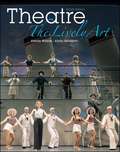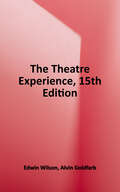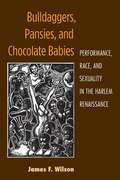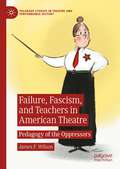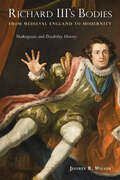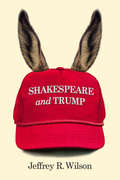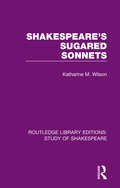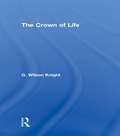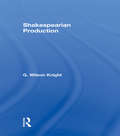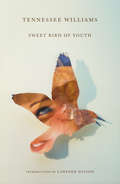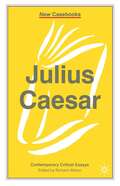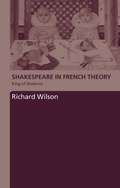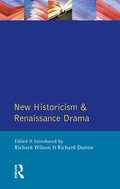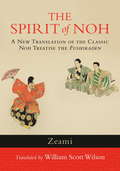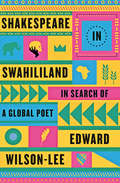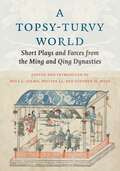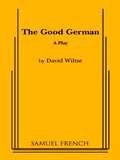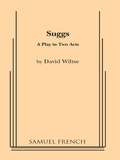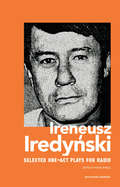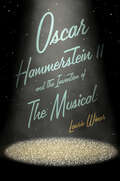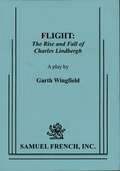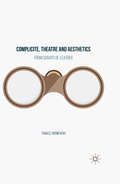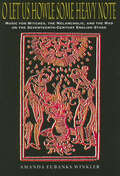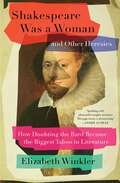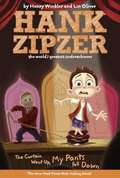- Table View
- List View
Theatre: The Lively Art (8th Edition)
by Edwin Wilson Alvin GoldfarbTheatre: The Lively Art will provide the background to theatre and it will encourage and inspire students to become lifelong audience members, if not actual theatre artists.
The Theatre Experience
by Edwin Wilson Alvin GoldfarbThe Theatre Experience, 15e prepares students to be well-informed, well-prepared theatre audience members. With an audience-centered narrative that engages today’s students, a vivid photo program that brings concepts to life, and features that teach and encourage a variety of skill sets, students master core concepts and learn to think critically about theatre and the world around them. As a result, students are better prepared for class and better prepared for theatregoing. The textbook is noted for its lively writing style and for helping students recognize how theatre relates to our everyday lives.
Bulldaggers, Pansies, and Chocolate Babies: Performance, Race, and Sexuality in the Harlem Renaissance
by James WilsonBulldaggers, Pansies, and Chocolate Babies shines the spotlight on historically neglected plays and performances that challenged early twentieth-century notions of the stratification of race, gender, class, and sexual orientation. On Broadway stages, in Harlem nightclubs and dance halls, and within private homes sponsoring rent parties, African American performers of the 1920s and early 1930s teased the limits of white middle-class morality. Blues-singing lesbians, popularly known as "bulldaggers," performed bawdy songs; cross-dressing men vied for the top prizes in lavish drag balls; and black and white women flaunted their sexuality in scandalous melodramas and musical revues. Race leaders, preachers, and theater critics spoke out against these performances that threatened to undermine social and political progress, but to no avail: mainstream audiences could not get enough of the riotous entertainment.<P> Many of the plays and performances explored here, central to the cultural debates of their time, had been previously overlooked by theater historians. Among the performances discussed are David Belasco's controversial production of Edward Sheldon and Charles MacArthur's Lulu Belle (1926), with its raucous, libidinous view of Harlem. The title character, as performed by a white woman in blackface, became a symbol of defiance for the gay subculture and was simultaneously held up as a symbol of supposedly immoral black women. African Americans Florence Mills and Ethel Waters, two of the most famous performers of the 1920s, countered the Lulu Belle stereotype in written statements and through parody, thereby reflecting the powerful effect this fictional character had on the popular imagination.<P> Bulldaggers, Pansies, and Chocolate Babies is based on historical archival research including readings of eyewitness accounts, newspaper reports, songs, and playscripts. Employing a cultural studies framework that incorporates queer and critical race theory, it argues against the widely held belief that the stereotypical forms of black, lesbian, and gay show business of the 1920s prohibited the emergence of distinctive new voices. Specialists in American studies, performance studies, African American studies, and gay and lesbian studies will find the book appealing, as will general readers interested in the vivid personalities and performances of the singers and actors introduced in the book.
Failure, Fascism, and Teachers in American Theatre: Pedagogy of the Oppressors (Palgrave Studies in Theatre and Performance History)
by James F. WilsonThis timely and accessible book explores the shifting representations of schoolteachers and professors in plays and performances primarily from the twentieth and twenty-first centuries in the United States. Examining various historical and recurring types, such as spinsters, schoolmarms, presumed sexual deviants, radicals and communists, fascists, and emasculated men teachers, Wilson shines the spotlight on both well-known and nearly-forgotten plays. The analysis draws on a range of scholars from cultural and gender studies, queer theory, and critical race discourses to consider teacher characters within notable education movements and periods of political upheaval. Richly illustrated, the book will appeal to theatre scholars and general readers as it delves into plays and performances that reflect cultural fears, desires, and fetishistic fantasies associated with educators. In the process, the scrutiny on the array of characters may help illuminate current attacks on real-life teachers while providing meaningful opportunities for intervention in the ongoing education wars.
Richard III's Bodies from Medieval England to Modernity: Shakespeare and Disability History
by Jeffrey R. WilsonRichard III will always be central to English disability history as both man and myth—a disabled medieval king made into a monster by his nation’s most important artist. In Richard III’s Bodies from Medieval England to Modernity, Jeffrey Wilson tracks disability over 500 years, from Richard’s own manuscripts, early Tudor propaganda, and x-rays of sixteenth-century paintings through Shakespeare’s soliloquies, into Samuel Johnson’s editorial notes, the first play produced by an African American Theater company, Freudian psychoanalysis, and the rise of disability theater. For Wilson, the changing meanings of disability created through shifting perspectives in Shakespeare’s plays prefigure a series of modern attempts to understand Richard’s body in different disciplinary contexts—from history and philosophy to sociology and medicine. While theorizing a role for Shakespeare in the field of disability history, Wilson reveals how Richard III has become an index for some of modernity’s central concerns—the tension between appearance and reality, the conflict between individual will and external forces of nature and culture, the possibility of upward social mobility, and social interaction between self and other, including questions of discrimination, prejudice, hatred, oppression, power, and justice.
Shakespeare and Trump
by Jeffrey R. WilsonShould we draw an analogy between Shakespeare’s tyrants—Richard III, Julius Caesar, Macbeth, and King Lear—and Donald Trump? In Shakespeare and Trump, Jeffrey Wilson applies literary criticism to real life, examining plot, character, villainy, soliloquy, tragedy, myth, and metaphor to identify the formal features of the Trump phenomenon, and its hidden causes, structure, and meanings. Wilsonapproaches his comparison prismatically. He first considers two high-concept (read: far-fetched) Shakespeare adaptations penned by Trump’s former chief political strategist Steve Bannon. He looks at University of Pennsylvania students protesting Trump by taking down a monument to Shakespeare. He reads Trump’s first 100 days in office against Netflix’s House of Cards. Wilson also addresses the summer 2017 Shakespeare in the Park production of Julius Caesar wherein an assassination of a Trump-ian leader caused corporations to withdraw sponsorship. These stories reveal a surprising—and bizarre—relationship between the provincial English playwright and the billionaire President of the United States, ostensibly a medieval king living in a modern world. The comparison reveals a politics that blends villainy and comedy en route to tragedy.
Shakespeare’s Sugared Sonnets (Routledge Library Editions: Study of Shakespeare)
by Katharine M. WilsonIn the course of some research into the musical element in English poetry, Dr Wilson read the work of the Elizabethan sonneteers chronologically and was struck by a suspicion that Shakespeare’s sonnets were parodies. Later she carried out a more thorough investigation, and this book, originally published in 1974, is the product: her early impressions had been justified beyond all expectation. Her investigation involved examining the background of each of Shakespeare’s sonnets, and this in itself is a contribution to scholarship. A surprising number of them are shown to be direct parodies of particular sonnets; all of them guy the sonnet convention, and the more difficult ones are easily explained by this hypothesis. Fresh correspondences between Shakespeare and his predecessors have come to light and his relationship with them is seen to be mocking. This is demonstrated in his borrowings from Ovid also, while the opening seventeen sonnets gain point as parody of Erasmus on marriage. The book opens with a short note on the origin of the sonnet in song, chivalric love and Plato. The sonnet theme in Shakespeare’s early comedies is treated freshly and the author throws light on the plays from a new angle. In the final chapter, among other themes, the implication of dating is considered, and here too some new material is discussed. However, Dr Wilson is aiming at a wider readership than that of scholars alone. She has a view of Shakespeare as a young man catering for "young-man laughter", as she puts it, and she never loses sight of this aspect in her study. Although the academic basis is there, the presentation is not academic. Her aim is clearly to share the joke with her readers.
Crown Of Life - Wilson Knight: Essays In Interpretation Of Shakespeare's Final Plays (University Paperbacks Ser.)
by G. Wilson KnightFirst published in 2002. Routledge is an imprint of Taylor & Francis, an informa company.
Shakespearian Production V 6: With Especial Reference To The Tragedies
by G. Wilson KnightThis part of the G. Wilson Knight collected works, Volume VI looks at his view on Shakespearian production with special reference to the Tragedies.
Sweet Bird of Youth
by Landford Wilson Tennessee WilliamsNow with an insightful new introduction, the author's original Foreword, and the one-act play, The Enemy: Time, on which Sweet Bird of Youth was based. Tennessee Williams knew how to tell a good tale, and this steamy, wrenching play about a faded movie star, Alexandra Del Lago, and about the lost innocence and corruption of Chance Wayne, reveals the dark side of the American dreams of youth and fame. Distinguished American playwright Lanford Wilson has written an insightful Introduction for this edition. Also included are Williams' original Foreword to the play; the one-act play The Enemy: Time--the germ for the full-length version, published here for the first time; an essay by Tennessee Williams scholar, Colby H. Kullman; and a chronology of the author's life.
Julius Caesar
by Richard WilsonJulius Caesar: A New Casebook provides students and academics with a selection of important essays by leading contemporary critics on Shakespeare's first "Globe" play. New historicist, feminist, psychoanalytic and Marxist readings of the tragedy have been chosen to highlight the urgency with which this drama of prophecy, interpretation and political crisis speaks to twenty-first century concerns about democracy, the media and mass communication.
Shakespeare in French Theory: King of Shadows
by Richard WilsonAt a time when the relevance of literary theory itself is frequently being questioned, Richard Wilson makes a compelling case for French Theory in Shakespeare Studies. Written in two parts, the first half looks at how French theorists such as Bourdieu, Cixous, Deleuze, Derrida and Foucault were themselves shaped by reading Shakespeare; while the second part applies their theories to the plays, highlighting the importance of both for current debates about borders, terrorism, toleration and a multi-cultural Europe. Contrasting French and Anglo-Saxon attitudes, Wilson shows how in France, Shakespeare has been seen not as a man for the monarchy, but a man of the mob. French Theory thus helps us understand why Shakepeare’s plays swing between violence and hope. Highlighting the recent religious turn in theory, Wilson encourages a reading of plays like Hamlet, Julius Caesar, A Midsummer Night’s Dream and Twelth Night as models for a future peace. Examining both the violent history and promising future of the plays, Shakespeare in French Theory is a timely reminder of the relevance of Shakespeare and the lasting value of French thinking for the democracy to come.
New Historicism and Renaissance Drama (Longman Critical Readers)
by Richard Wilson Richard DuttonNew Historicism has been one of the major developments in literary theory over the last decade, both in the USA and Europe. In this book, Wilson and Dutton examine the theories behind New Historicism and its celebrated impact in practice on Renaissance Drama, providing an important collection both for students of the genre and of literary theory.
The Spirit of Noh: A New Translation of the Classic Noh Treatise the Fushikaden
by William Scott Wilson ZeamiThe Japanese dramatic art of Noh has a rich six-hundred-year history and has had a huge influence on Japanese culture and such Western artists as Ezra Pound and The Japanese dramatic art of Noh has long held a fascination for people both in the East and the West. For six hundred years it has had a huge influence on Japanese culture--and has inspired such Western artists as Ezra Pound and William Butler Yeats. Here is a translation of the Fushikaden, a seminal treatise on Noh by the fifteenth-century actor and playwright Zeami (1363-1443), the most celebrated figure in the art's history. His writings on Noh were originally secret teachings that were later coveted among the highest ranks of the samurai class and first became available to the general public only in the twentieth century. The Fushikaden is the best known of Zeami's writings on Noh and it provides practical instruction for actors, gives valuable teachings on the aesthetics and spiritual culture of Japan, and offers a philosophical outlook on life. Along with the Fushikaden, translator William Scott Wilson includes a comprehensive introduction describing the intriguing history behind this enigmatic and influential art form, and also a new translation of one of Zeami's most moving plays, Atsumori.
Shakespeare in Swahililand: In Search of a Global Poet
by Edward Wilson-LeeAn exploration of Shakespeare as a global poetShakespeare in Swahililand tells the unexpected literary history of Shakespeare's influence in East Africa. Beginning with Victorian-era expeditions in which Shakespeare's works were the sole reading material carried into the interior, the Bard has been a vital touchstone throughout the region. His plays were printed by liberated slaves as one of the first texts in Swahili, performed by Indian laborers while they built the Uganda railroad, used to argue for native rights, and translated by intellectuals, revolutionaries, and independence leaders. Weaving together stories of explorers staggering through Africa's interior, eccentrics living out their dreams on the savanna, decadent émigrés, Cold War intrigues, and even Che Guevara, Edward Wilson-Lee--a Cambridge lecturer raised in Kenya--tallies Shakespeare's influence in Zanzibar, Kenya, Tanzania, Uganda, Ethiopia, and Sudan. Traveling through these countries, he speaks with everyone from theater directors and academics to soldiers and aid workers, discovering not only cultural dimensions traceable to Shakespeare's plays but also an overwhelming insistence that these works provide a key insight into the region. An astonishing work of empathy and historical vision, Shakespeare in Swahililand gets at the heart of what makes Shakespeare so universal and the role that his writings have played in thinking about what it means to be human.
A Topsy-Turvy World: Short Plays and Farces from the Ming and Qing Dynasties (Translations from the Asian Classics)
by Wilt L. Idema, Wai-Yee Li, and Stephen H. WestPlaywriting in many forms flourished during the late Ming and early Qing dynasties. Shorter theatrical genres in particular offered playwrights opportunities for experimentation with both dramatic form and social critique. Despite their originality and wit, these short plays have been overshadowed by the lengthy masterpieces of the southern drama tradition.A Topsy-Turvy World presents English translations of shorter sixteenth-to-eighteenth-century plays, spotlighting a lesser-known side of Chinese drama. Satirical and often earthy, these mostly one-act plays depict deceit, dissembling, reversed gender roles, and sudden upending of fortunes. With zest and humor, they portray henpecked husbands, supercilious and lustful monks, all-too-human sage kings, disgruntled officials, and overreaching young scholars. These plays provide a glimpse of Chinese daily life and mores even as they question or subvert the boundaries of social, moral, and political order.Each translation is preceded by a short introduction that describes the play’s author, context, formal qualities, and textual history. A Topsy-Turvy World offers a new view of a significant period in the development of the Chinese theatrical tradition and provides insight into the role of drama as cultural critique.
The Good German
by David WiltseFull Length, Drama \ 3 m, 1 f \ Int. \ Despite his prejudices, Karl Vogel offers refuge to a fugitive Jew during World War II to please his wife. Karl strongly dislikes Wilhelm Braun, but even after his wife dies he refuses to betray his devotion to her and her faith in his decency by evicting him. Karl's friend Siemi, a man who has anti-Semitic sympathies but does not agree with the German government's campaign to demonize Jews, has even become fond of Braun. Even so, Siemi becomes convinced he must betray Braun to the Gestapo in order to save Karl and himself. Karl is forced to decide whether his sense of decency is stronger than his sense of self preservation. Should he protect his unwanted guest or allow him to be turned over to a regime he finds repugnant? \ "Very powerful.''-Jewish Ledger
Suggs
by David WiltseFull Length, Drama / 4 m, 4 f / Int. / George Suggs, a bright, energentic young man, comes to the city to work as a sportscaster. He is fascinated but then repelled by the ugly realities he finds there, making him cynical and bitter. His career suffers, the wife he should never have married leaves him and he loses his mundane job. Dissolute and paranoid, making one last attempt to connect on a human level he employs a prostitute for company. Premiered at New York's Lincoln Center Theatre. / "Wry, funny sad, sharply observed, perceptive." -N.Y. Times
Ireneusz Iredynski: Selected One-Act Plays for Radio
by Kevin WindleThis vibrant anthology of radio plays features works by one of Poland's 'angry young men' playwrights. Ireneusz Iredynski made his début in literature as a Polish 'angry young man' in the late 1950s. He moved with great versatility from verse to stage plays, film-scripts and plays for radio. While some of the plays in this collection seem to present a bleak view of life, they show a gentler side of Iredynski. Here it is people's dreams rather than their worst nightmares that are explored. In these plays, situations are kept simple and the theatrical technique is spare and economical, but yet, the playwright demonstrates an unfailing theatrical flair and shows himself a master of dramatic tension and the final unexpected twist.
Oscar Hammerstein II and the Invention of the Musical
by Laurie WinerA new look at artist Oscar Hammerstein II as a pivotal and underestimated force in the creation of modern American culture You know his work—Show Boat, Oklahoma!, Carousel, The King and I. But you don’t really know Oscar Hammerstein II, the man who, more than anyone else, invented the American musical. Among the most commercially successful artists of his time, he was a fighter for social justice who constantly prodded his audiences to be better than they were. Diving deep into Hammerstein’s life, examining his papers and his lyrics, critic Laurie Winer shows how he orchestrated a collective reimagining of America, urging it forward with a subtly progressive vision of the relationship between country and city, rich and poor, America and the rest of the world. His rejection of bitterness, his openness to strangers, and his optimistic humor shaped not only the musical but the American dream itself. His vision can continue to be a touchstone to this day.
Flight (Wingfield)
by Garth WingfieldDrama / 4m, 2f / Unit Set / When he touched down in Paris after more than 30 hours in the air, he became the first person to cross the Atlantic in an airplane... and an instantaneous star, adored the world over. But that was only the first leg of his complicated journey. Welcome to the world of FLIGHT, a powerful, provocative new play. Following Charles Lindbergh during 14 perilous years of his life - from the journey to Paris through the kidnapping of his son and up to the beginning of World War II - FLIGHT is a rich examination of a singular American life... and a thoroughly fascinating theatrical experience.
Complicite, Theatre and Aesthetics: From Scraps of Leather
by Tomasz WiśniewskiThis book presents a pioneering critical study of Complicite's work throughout the years. Drawing on an extensive overview of the available research material - including interviews, manuscripts and the company's own archive - the book is framed within a clearly defined research perspective and explores the singularity of theatre communication. The book results from an encounter between the London-based - but cosmopolitan in scope - company, and a fresh application of the form-oriented scholarship of Eastern Europe, Yuri Lotman's semiosphere in particular. Focused on the aesthetics of Complicite, this study achieves a critical distance and undertakes multidimensional scrutiny of the available research material. By identifying the principles of Complicite's aesthetics, the book attempts to grasp the company's artistic paradigm. It focuses on ways of creating, preserving, and decoding meanings, rather than on the nuances of performance or contextual issues.
O Let Us Howle Some Heavy Note: Music for Witches, the Melancholic, and the Mad on the Seventeenth-Century English Stage
by Amanda Eubanks WinklerIn the 17th century, harmonious sounds were thought to represent the well-ordered body of the obedient subject, and, by extension, the well-ordered state; conversely, discordant, unpleasant music represented both those who caused disorder (murderers, drunkards, witches, traitors) and those who suffered from bodily disorders (melancholics, madmen, and madwomen). While these theoretical correspondences seem straightforward, in theatrical practice the musical portrayals of disorderly characters were multivalent and often ambiguous.O Let Us Howle Some Heavy Note focuses on the various ways that theatrical music represented disorderly subjects--those who presented either a direct or metaphorical threat to the health of the English kingdom in 17th-century England. Using theater music to examine narratives of social history, Winkler demonstrates how music reinscribed and often resisted conservative, political, religious, gender, and social ideologies.
Shakespeare Was a Woman and Other Heresies: How Doubting the Bard Became the Biggest Taboo in Literature
by Elizabeth WinklerAn &“extraordinarily brilliant&” and &“pleasurably naughty&” (André Aciman) investigation into the Shakespeare authorship question, exploring how doubting that William Shakespeare wrote his plays became an act of blasphemy…and who the Bard might really be.The theory that Shakespeare may not have written the works that bear his name is the most horrible, unspeakable subject in the history of English literature. Scholars admit that the Bard&’s biography is a &“black hole,&” yet to publicly question the identity of the god of English literature is unacceptable, even (some say) &“immoral.&” In Shakespeare Was a Woman and Other Heresies, journalist and literary critic Elizabeth Winkler sets out to probe the origins of this literary taboo. Whisking you from London to Stratford-Upon-Avon to Washington, DC, she pulls back the curtain to show how the forces of nationalism and empire, religion and mythmaking, gender and class have shaped our admiration for Shakespeare across the centuries. As she considers the writers and thinkers—from Walt Whitman to Sigmund Freud to Supreme Court justices—who have grappled with the riddle of the plays&’ origins, she explores who may perhaps have been hiding behind his name. A forgotten woman? A disgraced aristocrat? A government spy? Hovering over the mystery are Shakespeare&’s plays themselves, with their love for mistaken identities, disguises, and things never quite being what they seem. As she interviews scholars and skeptics, Winkler&’s interest turns to the larger problem of historical truth—and of how human imperfections (bias, blindness, subjectivity) shape our construction of the past. History is a story, and the story we find may depend on the story we&’re looking for. &“Lively&” (The Washington Post), &“fascinating&” (Amanda Foreman), and &“intrepid&” (Stacy Schiff), Shakespeare Was a Woman and Other Heresies will forever change how you think of Shakespeare…and of how we as a society decide what&’s up for debate and what&’s just nonsense, just heresy.
The Curtain Went Up, My Pants Fell Down (Hank Zipzer, the World's Greatest Underachiever #11)
by Henry Winkler Lin OliverHank Zipzer is failing math, so he has to work with Heather Payne, resident class brain, to help get his grades up. At the same time, Hank’s school is putting on a production of The King and I. As coincidence would have it, Hank is cast as the King, and Heather as Anna. But when Hank’s dad tells him he can only appear in the play if he gets a B on his next math test, Hank knows he has to hit the books. Can Hank pull through in time for the show?
